Writing and Photos © por Alba Parrado Puente, Spanish Nurse and Midwife, Volunteer of be artsy in Achcham.
From one of the most chaotic Indian cities (Varanasí) to one of the most peaceful little villages in Nepal there are around 800 km. and a four days journey by local bus, a bus as hellish as enjoyable.
Crossing hundreds of small villages, looking through the window, sharing seats with several local people, exchanging smiles, listening to raucous and happy music, smelling a varied range or everything, tasting the dust… you can really approach to this country.
Basti is the first village we have chosen and the one with which we want to collaborate. Basti means “city” or a similar concept in Nepalese. It is a magical place in the mountain chain of the HImalayas that not even the roads do reach… Not even the infamous Coca-Cola!
This valley, only accesible on foot, counts with hundreds or thousands of farming terraces that picture a telltale landscape.

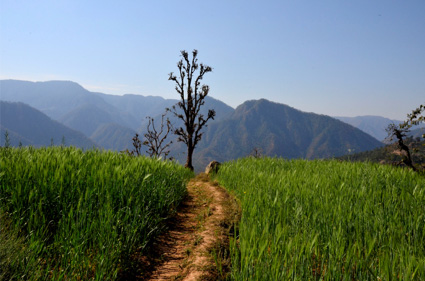
A pure and far away place apart from progress and globalization, one of the thousands that exist here in Nepal.
This area particularly, the Far-West, is one of the most rural, both for being of difficult access as well as for the lack of tourists, and thanks to that it still keeps is essence.
We don’t know exactly how many inhabitants does the village have, but we know that it is divided in 9 “bastis” or groups of dwellings that are scattered (like all villages in Nepal) and that around 150 boys and girls do assist to school, from which the main majority must walk approximately three hours to get there, as they live in those shacks you can spot far away, in the mountains…
Of the children that don’t come to school and who we see daily taking care of the goats or carriying around their younger siblings, peering curiously through the wooden windows of the class, nobody spokes, nor do they know about the percentage they suppose.
The Government grants a financial support of 300 rupees a year (around 3 euro) to promote their assistance to school, but that does not seem to be very effective, maybe due to the petty amount that really is.
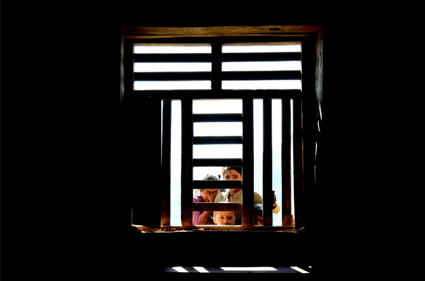
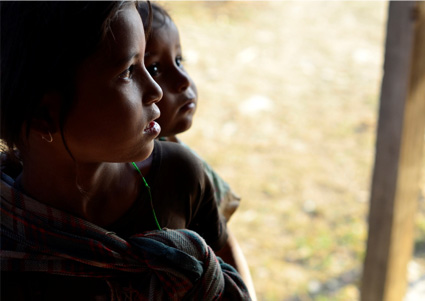
When you accommodate to their lifestyle, eat what they eat (which is exactly the same every day, dalbat – lentils with rice -, takari – vegetables – and chapati – bread/flattened dough -), take a shower in the village fountain fully dressed (to wash it at the same time) the four hours a day that there is water, sleep like they sleep (to 4 people in frigging wooden planks!), learn to wipe your bottom without toilet paper (white gold for me from now on) and clean your nose just blowing out (like when you are in the shower), you realize the quantity of water we waste and all the things we don’t really need. And you think even harder about all the distractions and excess information, all the adverts and consumerism we just swallow without being aware. You start to surprise yourself by thinking that the three trousers and sweatshirts you carry in your backpack are even too much!
Without really knowing what we would find in this new adventure, we came up here, six people (3 Nepalese and 3 foreigners).
Asking for the nurse, the teachers and groups of women, we started little by little knowing the villagers. It was a nice surprise to see how do the women organize themselves here and see that apart from getting up a 4 in the morning, cook, take care of the children, and work hard chipping and carrying stones, they also allocate some of their time to share their worries and to improve their lives. This has no other name: they are SUPERWOMEN! (Point that I consider important for it is incredible: it is more than 50 kg. what they carry, and they bear it on their heads!!).
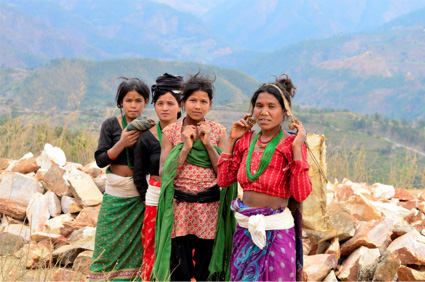

They have also created a group of volunteers that help in the health care area and they were always open to share.
As we could see by ourselves, the few men around (most of them are working in India) just play cards and get as drunk as possible with roxy (a Nepalese spirits). Here they do not punch but they cut! Why must it be that the women give all the money they earn to them?
One of the details that most strikes me is that the life expectancy of the women in this region is of around 52 years, lower than the men, contrary to most countries. The day I decided to share with them the recipe for the Spanish omelette and went to cook, I started to cry. Because the smoke that the sticks they used to heat up the saucepan produced was really awful. The room they use as kitchen-lounge-bedroom has not ventilation… Now I understand that the first cause of death at such early ages is breathing problems!
I think that the people here quickly understood why we were there, although we only spoke about sex education and critical photography. This eased that they would open up to us to share what they felt about their menstruation, the Chhaupadi and what this tradition means for them, without us having to bring up the subject.
Our intention has always been to come and give information and resources that would enable the girls and women to empower themselves in their decisions, and not to impart precooked and westernized ideas about anything, as incomprehensible their customs may seem to us.
In a world where most of the ONGs are bought, because the grants and financing come from international companies with very specific financial interests, where it does not mind what are you going for, but the fact that you do go… where people are not important, but the figures, and where they believe that progress, such as we understand it, must be brought to every corner of the planet. In a world where the human being has fallen so many times into the error of subduing the local population and destroying its customs and where we are still doing the same. In a world where the commercial spirit prevails and where material success is the main moral standard, there should not really be ground for finding it surprising that the human relationships follow the same exchange frame that rules the assets and work market. In such a world, we have to tread very carefully not to fall in the trap and create colonisations of the XXI century, because, despite the best of intentions, this can happen.
Class with the teenagers were much better than we imagined, although I must say that with a translator, they seem a bit awkard. This about the language barrier, is a real challenge! It is one of the things that most frustrated us, because the trust we created or wanted to create was very limited. But it also had good things, like Nepalese nurses, without experience in this field, learning to trust in themselves and to love teaching as a basic pillar.
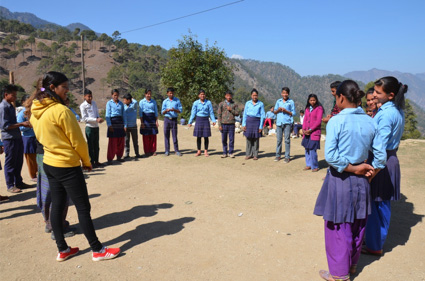
Despite certain limitations, the women and girls could elaborate telling about their experiences with the Chhaupadi; how are they forced to sleep outside their homes when they have their period, from barns without a door in the best of cases, to corners covered with a bit of straw. How they have to undertake the works entailing more physical effort (as they cannot work in the kitchen during those days). How they are handed over the water because they are not allowed to take it themselves. How are they deprived of some food or of going to sacred places and temples.
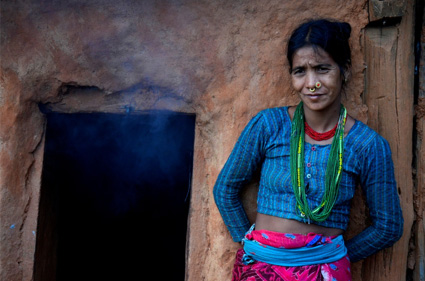
The girls at school used to say that they did not like doing all that and that they did not want to continue and the boys said that they did not believe that anything bad would happen if they didn’t. The women said that they were all for leaving this practice… And… then? Where is the problem? Society and the old guard (usually called grandmothers) seem to be the main reason, as the men don’t seem to have nothing to do with it. Maybe the next generation would never live this and they may only hear old stories about a tradition already fallen into oblivion. That only depends on the women themselves.
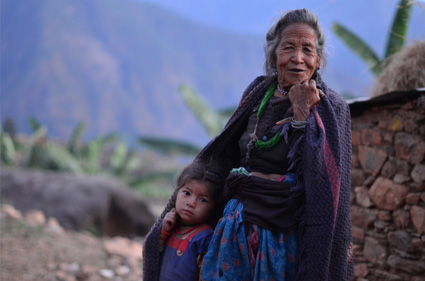

On evening they took us to visit some of these “Chhau houses” and it surprised us to see how some of them would pose for a picture, as if doing the real thing. Apparently somebody else before us had been there to make a photograpic report about this… Now I understand how some journalists do to “catch” this crucial scenes! But, what about the women? Why would they do something like this? Do they want the outside world to know about this?

On Women’s Day we thought about doing some event. We were very surprised when we asked and they said that they already had a program. And even more when we saw dozens of them shouting in the “village square”: We don’t want more Chhaupadi! We don’t want more violence! In the midst of it, amongs them, we spent the whole day… I don’t know very well how did we understand each other because we barely speak a couple of works in Nepalese, but the thing is that we became really excited and we danced with them, supporting them in their claims.
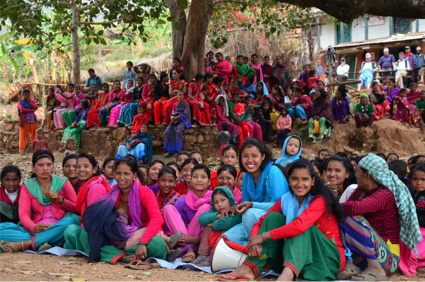
The Government prohibited the Chhaupadi in 2005 and since then till now they have been going around the villages doing seminars and putting up signs in the “squares” that say: “Village free from Chhaupadi”, although this practice is still on in some areas in Nepal. On another hand, I thought that it was done in some very specific places, but judging by some Nepalese women from different districts with whom I have spoken, they have told me their personal experience from when they had their first periods. They were closed up in a room wihtout light for seven days, with just enough to eat and drink. Apart from may other beliefs, like that if they eat bananas during that time they became barren. And if you think about it, this last part, it is not that different from the beliefs in Spain at the time of my grandmother, when you should not water the plants or prepare certain meals.
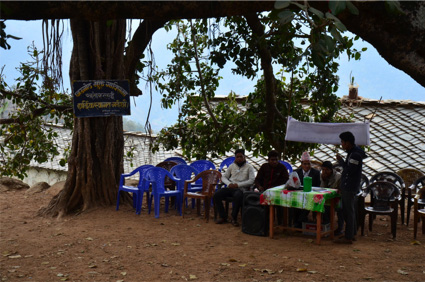
The last day in Basti was intense… the nurses that are usually in each “health point” had left the village and we not only had one “accident” but two. Between blood and sweat, without gloves or dressings, we stiched the finger of one of the most strong women I have ever met. I had never seen anything like it and I wish we had had a hospital nearby with a real surgeon… but here there was no other option. A little later they came searching for us because a small child had been hit in the head with a stone… here the difficult part was to stich the wound in the middle of all the screams and cries, dirty blankets and smoke, inside a small mud hut and with 12 women or so around. When we were done and we went to bed, Alba and me we held hands and then was when we gave ourselves permission to express everything. It is not only the fact of living a stressful situation like that one, for me it was more to think what would these people have done or what is it what they usually do when they are in this situation. Going to the nearest hospital means at least 6 hours walking and clearly it is not an option for the majority from a financial point of view.
Kunti Bandali was the second village we went to. I could not say why, but when I arrived I felt that something very different to Basti was expecting us. Looking closely, I understood what the reason was: the place where we were staying, more than a village, is a bazaar-village-road (although I would say more path than road), where lived mostly men whose main objective was to keep an optimum level of alcohol in their blood, and some women and children ou of school who do what the men should be doing… an atmosphere where you can see, hear, smell and even touch this reality is difficult to digest.
In this school, the classes flowed in a totally different manner from each other, so our improvisation habilities were really tested. From interactive classes and open to discussion to classes where passivity and indiference ruled. Where they would speak about their menstruation freely and where they would not even mention it despite our efforts.
We found out that Unicef had been here the previous year teaching about the VIH (as this region quite suffers its effects) and about contraceptive methods. They had the knowledge that it is passed by maintaning sexual relationships but they had no idea what sexuality is or what is a relationship, much less about using a condom. All our classes were based on the expression of the feelings and emotions that the growing into adulthood provokes in them, and the importance of expressing ourselves and having a good communication.
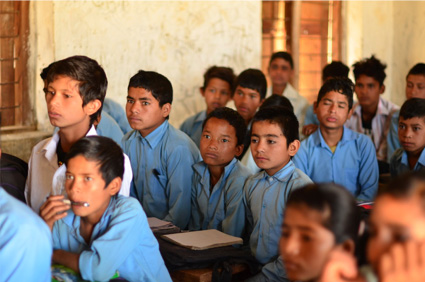
The meetings with the women were not easy mainly for two reasons.
When Unicef and other big ONGs came to this place, they paid for each session to each woman a certain amount of money so all of them would assist. Maybe to increase their statistics, not minding if the women were or not interested or maybe just so they would leave their hard work and would attend. We were not going to do the same.
On another hand, contrary to Basti, they are more entrenched with the Chhaupadi and they are not in the way of changing, so the dialogue was little to that regard. It is curious to see the two faces of the coin and more curious still that the village more in touch with the rest of the world and with more options to information, is the one who more wishes to stay as it is.
The menstrual cup offered to girls and women of both villages I think was well received. We believe that when the whole family lives in the same space, where they also undertake all the daily activities, the problem of menstruating without having more than a dirty cloth as sanitary pad, can be the reason why, nowadays, they still sleep outside the house. In any case, that quality of life that they can have for one week a month and that the cup can give, is simply great, as it was in my case in the case of many other.
Regarding the picture part as the way of expressing themselves before their families and their community, did seem to me a very useful tool and with which, in some way, they could get rid of their inhibitions and enjoy themselves.
From my point of view, we have been too little time in each village, as when we started to build confidence and to became part of their lives, we just went away. And that has not allowed us to take the maximum advantage of what both us and the others had to offer.
Many people tells me that it is brilliant that I come and help and that I am caring and altruist… but it is not as the majority sees it. In my opinion, when you give, you also receive, and all the people who do this kind of thing is because it gives them something, even if only because they can just learn something else about the world, because it goes with their principles or for their personal growth.
What I know is that I learn, learn and learn to unlearn, to not judge anything, to love…
The way of travelling has changed for me or, better said, has changed me, allowing me to see the light more clearly, what I am and I have always been. Like the song from the Nepalese Hymn that all the children must sing every morning says: “We are from the East or the West, from different casts or races, but we are all equal and part of the same, connected we are part of a precious necklace”. (I must say that I frowned at the “streching exercises” that they do in the rows before singing the hymn, as to my eyes it looked like a military service, but must also say that after knowing its meaning, my “eyesight” became more tolerant).
For all this, to go visiting monuments, restaurants or markets full of tourists, now seems too little and uncomplete, as if you only get to that when you travel, you lose the spirit of the place, its culture, its people… and with that the comprehension and the understanding of what is around you wherever you go. The wonders you find when you look closely is not a passive action, however, it requests that we leave out our own learnings not to fall into the error of judging instead of loving.
To have the opportunity to be here, drinking from this culture, earning in life experiences, is something that money can’t pay, indispensable and unique.
Maybe this is not for everybody, but it sure is for me. Do travel! Follow up roads, paths and mountains! Do have a bath in sacred rivers, salt lakes, thermal waters and coral reefs.
Do tastes and, dust and earth!
Do climb the highest and most beautiful mountains and go down the deepest and unexplored seas!
Do not judge! Break your limits! Love! Dream! Fly!

West Nepal girls need this kind of program. And we need help to continue the project!
Now you can donate for paying one month salary to the nurse, or for some hygiene kit or for the menstrual cup control in September: http://beartsy.org/get-involved-with-rato-baltin
Or If you feel like it, you can donate via bank transfer at: Banc Sabadell IBAN: ES23 0081 0900 8200 0430 1934 BIC: BSABESBB (your recurring donation will help us have a better planning of our budget to carry out the projects undertaken).
Or take a look others ways to donate in http://beartsy.org/donate/
Thank You! 🙂
Translated to English by Tere Salinero
